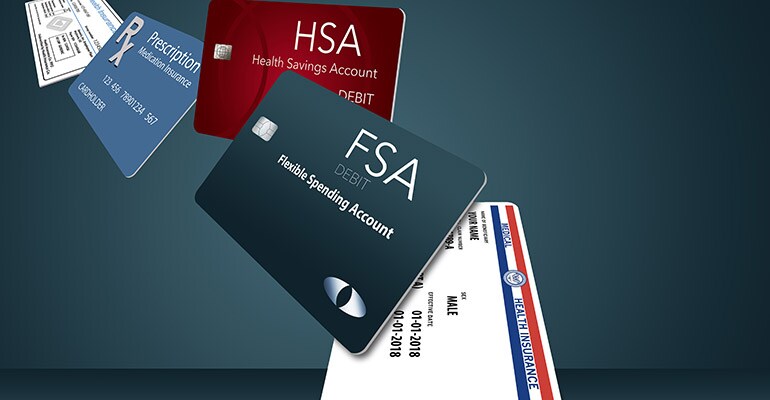Can I Purchase Eyeglasses with My FSA or HSA?
Nov 01, 2023
What are pre-tax health accounts? How do they work and how else can you use them for your eye care needs?
Pre-tax health accounts, also known as healthcare spending accounts or tax-advantaged health accounts, are financial accounts that allow individuals to set aside money on a pre-tax basis to pay for eligible medical expenses. These accounts are typically offered by employers as part of a benefits package.

There are a few common types of pre-tax health accounts:
Health Savings Account (HSA): This account is available to individuals who have a qualifying high-deductible health plan (HDHP). Contributions to HSAs are tax-deductible, and the funds can be used to cover current and future medical expenses. Any unused funds roll over year to year, and the account is portable, meaning it can be taken with you if you change jobs.
Flexible Spending Account (FSA): FSAs are offered by employers and allow employees to contribute pre-tax dollars to pay for eligible medical expenses not covered by insurance, such as deductibles, copayments, and certain medical supplies. Unlike HSAs, unused FSA funds typically do not roll over at the end of the year, although some employers offer a grace period or a limited carryover.
Health Reimbursement Arrangement (HRA): HRAs are solely funded by employers and are used to reimburse employees for qualified medical expenses. Contributions to HRAs are tax-free, and unlike HSAs and FSAs, the funds belong to the employer, meaning they generally do not carry over if not used within a specific period.
These pre-tax health accounts provide a way for individuals to set aside money for healthcare expenses while reducing their taxable income. It's important to familiarize yourself with the specific rules and regulations associated with each type of account, as they can vary. Consulting with a financial advisor or reviewing the official guidelines is recommended.

Which Vision Expenses Are Covered by an HSA or FSA?
Eye Exams: The cost of routine eye exams, whether for prescription glasses or contact lenses, is typically eligible for reimbursement. This includes the examination itself as well as any necessary refractions.
Prescription Glasses: Expenses related to the purchase of prescription eyeglasses, including frames and lenses, are generally eligible. However, certain luxury or non-prescription items may not be covered.
Reading glasses: Reading glasses are considered eligible expenses under most HSA and FSA guidelines as long as they are prescribed by a healthcare professional.
Prescription Sunglasses: If you require prescription sunglasses for vision correction purposes, the cost of the lenses and frames may be eligible for reimbursement.

Which Vision Expenses Are Not Covered by an HSA or FSA?
While Health Savings Accounts (HSAs) and Flexible Spending Accounts (FSAs) can cover a wide range of vision-related expenses, there are certain vision expenses that are typically not eligible for reimbursement. Here are some common examples:
Non-Prescription Sunglasses: Expenses for non-prescription or purely cosmetic sunglasses are generally not eligible for reimbursement. These include sunglasses without any vision correction function.
Vision Correction for Cosmetic Purposes: Procedures like vision correction surgeries, such as Lasik, that are performed solely for cosmetic purposes are usually not covered. However, if these procedures are medically necessary, such as for treating a specific eye condition, they may be eligible for reimbursement.
Eye Drops and Over-the-Counter (OTC) Products: Over-the-counter eye drops, contact lens solutions, and other non-prescription eye care products are typically not eligible for reimbursement. However, if they are prescribed by a healthcare professional, they may be eligible.
Eye Cosmetics: Expenses related to cosmetic eye products like mascara, eyeliner, eyeshadow, or false eyelashes are typically not covered as they are considered non-medical expenses.
Vision Coverage Premiums: The premiums you pay for vision insurance or standalone vision plans are generally not eligible for reimbursement through an HSA or FSA. However, expenses incurred for vision care services covered under the insurance plan may be eligible.

How and Where Can I Use My HSA or FSA to Buy Glasses?
Using your Health Savings Account (HSA) or Flexible Spending Account (FSA) to purchase glasses at glassesshop, here are the steps:
Select Frames and Lenses: Once you have your prescription, you can choose frames and lenses that suit your style and vision needs.
Pay with Your HSA or FSA: When making the purchase, inform our customer service that you would like to use your HSA or FSA. Glassesshop accepts FSA and HSA dollars for all prescription eyewear purchases (including prescription sunglasses, progressives, and reading eyeglasses), as long as your FSA or HSA card is affiliated with a major credit card.